| Srl | Item |
| 1 |
ID:
153489
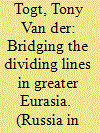

|
|
|
|
|
| Summary/Abstract |
In recent years, we have witnessed increased competition and divergence in development between two forms of regional integration, the European Union (EU) and the Eurasian Economic Union (EEU). This reached a climax in the Ukraine crisis, the most important geopolitical conflict between Russia and the West in the post-Soviet space. Geopolitics is back with a vengeance and now also has serious geo-economic consequences.
|
|
|
|
|
|
|
|
|
|
|
|
|
|
|
|
| 2 |
ID:
188487


|
|
|
|
|
| Summary/Abstract |
ON JUNE 29, 2022, Ashgabat hosted an important international event - the Sixth Caspian Summit. In this regard, I believe it is important to once again consider the role and place of the Caspian Region in the more just, democratic, and sustainable multipolar system that is taking shape today.
|
|
|
|
|
|
|
|
|
|
|
|
|
|
|
|
| 3 |
ID:
180738


|
|
|
|
|
| Summary/Abstract |
OVER the past several decades, the Collective Security Treaty Organization (CSTO) has evolved as an internationally recognized instrument of ensuring regional security and the collective protection of allied states against external aggression.
|
|
|
|
|
|
|
|
|
|
|
|
|
|
|
|
| 4 |
ID:
163417


|
|
|
|
|
| Summary/Abstract |
Russian foreign policy thinkers have used a succession of geopolitical imaginaries to articulate a Russian role and identity in the post-Cold War era. This essay analyses one such spatial project, the idea of ‘Greater Eurasia’, which imagines a new geopolitical geometry centred on Sino–Russian cooperation. The ‘Greater Eurasia’ discourse provides a new role for Russia in international affairs but also makes far-reaching claims about the nature of the emerging, post-liberal world order. The essay concludes with an analysis of the main challenges to the ‘Greater Eurasia’ project.
|
|
|
|
|
|
|
|
|
|
|
|
|
|
|
|
| 5 |
ID:
188398
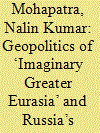

|
|
|
|
|
| Summary/Abstract |
Russia, because of its location and geopolitical proclivity, through its geopolitical doctrines of ‘Greater Eurasia’ and ‘Asia Pivot’ is interested in playing a major role in the Indo-Pacific. The growing role of the United States along with a marked increase in China’s expansionist policy in the Indo-Pacific region is also generating apprehensions for Russia. India, as a ‘pivotal player’ in the Indo-Pacific region, is also affected by the strategic developments, especially due to China's ‘imperial maneuvering’ in this geopolitical space. Being part of the Quad, and at the same time having a strategic partnership with Russia, provides India with an immense strategic opportunity. India can also strengthen its outreach to the Central Asian geopolitical space, particularly to energy-rich Kazakhstan through Russia’s Siberia and the Far East which connect with the Indo-Pacific. Russia-Ukraine war is also posing additional security challenges to Indo-Pacific.
|
|
|
|
|
|
|
|
|
|
|
|
|
|
|
|
| 6 |
ID:
161054
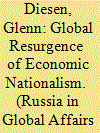

|
|
|
|
|
| Summary/Abstract |
Economic nationalism advocates state intervention in the market to create favorable symmetry in economic interdependence with other powers. All major economies have ascended to greatness with state interventions, and economic liberalism becomes a mere covert economic nationalism by hegemons. Once in control over the levers of the global economy it is in the interest of the hegemon to propagate economic liberalism to integrate other powers into asymmetrical interdependent partnerships. The Trump administration’s embrace of overt economic nationalism indicates the unravelling of the U.S. privileged geo-economic position. Relative decline is evident by a crumbling U.S. manufacturing base and narrowing superiority in innovations, the creation of alternative trade corridors outside U.S. control, and nascent rivals to the Bretton Wood institutions and the U.S. dollar. As geo-economic power shifts from the West to the East and invokes a global resurgence of economic nationalism, opportunities arise for Russia to develop more symmetry in the interdependent global economy.
|
|
|
|
|
|
|
|
|
|
|
|
|
|
|
|
| 7 |
ID:
148724
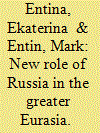

|
|
|
|
|
| Summary/Abstract |
Key ideas associated with Eurasianism were developed in the 19th century. The narrative of classical Eurasianism in the 1920s was developed to explain that Western civilisation was not superior to other civilisations. Eurasia is the middle continent between other parts of Europe and Asia. There are historical, geographical, and cultural impetuses here which push nations to different forms of association. However, the dissolution of the USSR gave birth to new ideologies and political theories of Eurasianism. The most positive one was extensively developed by the President of Kazakhstan Nursultan Nazarbaev. Today, we witness the fourth stage of the development of Eurasianism.
|
|
|
|
|
|
|
|
|
|
|
|
|
|
|
|
| 8 |
ID:
163770
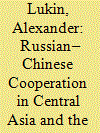

|
|
|
|
|
| Summary/Abstract |
The author argues that Russian–Chinese rapprochement is a fundamental feature of the current changing system of international relations. Apart from its own significance, it has become important because it stimulated and, in some cases, laid the foundation for many broader international processes: the creation of the multipolar world, the emergence of such international groups and organisations as BRICS and Shanghai Cooperation Organisation (SCO), the coordination between Eurasian Economic Union and the Chinese initiative of Silk Road Economic Belt and others. Recently, all these processes led to the idea of Greater Eurasia or Eurasian partnership.
|
|
|
|
|
|
|
|
|
|
|
|
|
|
|
|